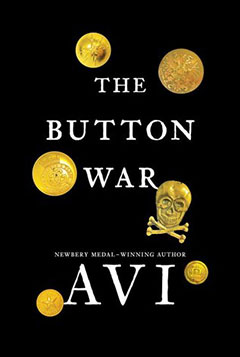It must have been something like forty years ago.
I was visiting my father-in-law with my older boys. They were playing with something they were collecting, perhaps baseball cards, or some such.
Looking on, my father-in-law said, “When I was a kid, we boys collected things, too.”
The story he told was rather unusual. He was raised in a village somewhere in Eastern Europe, but with so many national boundary changes, he could not even say precisely which country. During World War One, he said, his village was invaded and taken over by now this army, now that, from different nations. When these armies took over his village, the soldiers commandeered the women to wash their uniforms. Once washed, the uniforms were hung out to dry. The boys in the village—so my father-in-law related—would sneak about, cut the buttons from the uniforms, collect them, and trade them amongst themselves. This in the midst of The Great War.
 I never forgot the story, and it is that tale upon which I based my newest book, The Button War.
I never forgot the story, and it is that tale upon which I based my newest book, The Button War.
The essence of the plot—I set it in (Russian occupied) Poland—at the unset of World War One—is how a group of boys engage in a contest as to who can steal the best military button from the different armies that attack and occupy their isolated village. What begins as a lark, and a fairly harmless (and innocent) series of dares, escalates into something very much more ominous, even as the violence in the village intensifies.
If you read about World War One, when “The lights went out all over Europe,” you are struck how, by common historical agreement, The Great War (as it was called) was a war that had no particular meaning, other than ego, nationalistic rivalry, as well as profound and lethal stupidity. During the war, something like sixteen million people were killed, many of them civilians, often in the most ghastly ways. The war destroyed ancient empires, caused multiple revolutions, and virtually ensured that World War Two would happen, with its own attendant horrors. A fair number of the consequences of The Great War are still being played out today, a hundred years later. One could argue that The Great War has never ended, To encapsulate all of this in a short novel would not have been possible, and indeed foolish to have even been attempted. My story is about boys, boys who, in their innocence and sense of fun, their dares, echo (without their knowing it) the cruel and destructive folly of their adult world.
As part of my research for the book I began to collect military buttons from World War One. You may see them on the cover of the book.
I found theses buttons fascinating. One could have invented a story about each one of them. Who wore it? Where? What happened to the person? What experiences did that person have? How did these buttons ever come to be posted on eBay™, where I discovered and bought them?
To my own surprise, I found myself wanting more and more of these buttons. I, too, wanted the best one. Which is what The Button War is all about.
I dare you to read it.
4 thoughts on “Story Behind the Story #68: <em>The Button War</em>”
Morning, Avi, As President of the Long Island Radio and Television Historical Society, we bought a number of radios, phones etc from WWI from Amazon and I saw a number of these buttons on sale. I was tempted but they didn’t fit what we were exhibiting. I have to be care collecting things as I already went through teddy bears, gargoyles and music boxes. Oh and of course, stamps. Connie Currie
Can’t wait to read this—your stories never disappoint! I know how addicting collecting can be as I continue to collect autographed children’s books, original art from children’s books, versions of The Night Before Christmas books, Oaxaca carved animals, Mata Ortiz pottery, Sun faces, hearts, lacquered boxes from India, hedgehogs, small chicken figures&.….….….
I love your work, Avi. And have long appreciated your generosity in sharing the backstory. Many Thanks!
This was a great book! I love the backstory. Thank you for sharing.